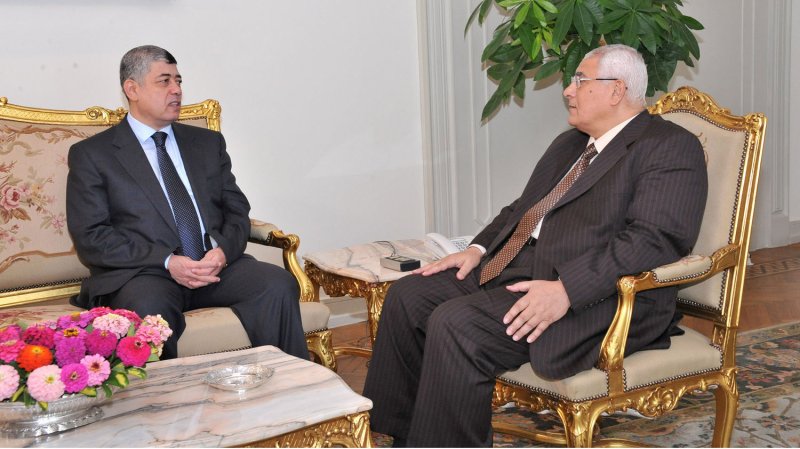In this official handout from the Egyptian Presidency Office, Interior minister Mohamed Ibrahim (L) meets with interim president Adly Mansour at the presidential palace in Cairo in Egypt, July 6, 2013. UPI |
License Photo
CAIRO, July 8 (UPI) -- The overthrow of Egyptian President Mohamed Morsi may have been "outside the legal framework" but it wasn't a coup, opposition figure Mohamed ElBaradei said.
"This was not a coup. More than 20 million people took to the streets because the situation was no longer acceptable," ElBaradei told Der Spiegel in an interview published Monday.
"Without Morsi's removal from office, we would have been headed toward a fascist state, or there would have been a civil war. It was a painful decision. It was outside the legal framework, but we had no other choice."
Morsi may have been democratically elected in 2012, but he violated the "spirit of democracy" by targeting the judiciary, putting his Muslim Brotherhood associates in key positions, pressuring media and cutting back rights for women and religious minorities during his year in office, ElBaradei said.
After a turbulent year that was marked by violent anti-government demonstrations, Morsi was ousted last week and was being detained by the military in an undisclosed location.
ElBaradei was to have been nominated to be the country's interim prime minister but the nomination of the Nobel Peace Prize laureate has been put on hold.
While noting the difficulties in developing a road map to democracy, ElBaradei said Egypt needs elections within a year and a new constitution "that cannot be abused" and establishes equality and freedom.
"And we need functioning institutions, an independent judiciary and a separation of powers," he said.
When asked about whether the detention of Muslim Brotherhood officials and the military's role in Morsi's ouster, ElBaradei said, "You cannot apply your high standards to a country burdened with decades of autocratic rule. Our democracy is still in its infancy."
Ever since Morsi's overthrow, ElBaradei said he has been calling for the Muslim Brotherhood to be part of the country's move toward democracy, that Morsi be treated with dignity and that no one should be tried capriciously.
"These are the conditions of national reconciliation," said Elbaradei, who received the Nobel Peace Prize when he led the International Atomic Energy Agency, the U.N. nuclear watchdog.
"Egypt is indeed deeply divided. Without reconciliation we have no future," he said. "The Muslim Brotherhood is an important part of our society. I very much hope that it will participate in the next round of talks. I will be the first to protest if the imperative of fairness isn't adhered to."
Military leaders recognize their role, historically speaking, in the country's upheaval, the opposition figure told De Spiegel.
"The military doesn't get a free pass from me," ElBaradei said. "My red line is this: I don't align myself with anyone who ignores tolerance and democracy. And they know that."
ElBaradei told Der Spiegel, "I don't see myself in the role of the future president. I want to use my influence to bring Egyptians together and help them reconcile."
If the Muslim Brotherhood puts up candidates in the next election and wins, ElBaradei said he could support the officeholders "if they commit themselves to democracy, and if we have a constitution and a parliament that will prevent them from abusing their power the way Morsi did."















